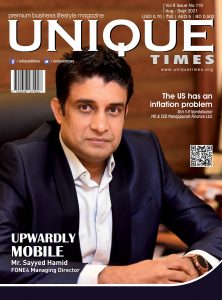UPWARDLY MOBILE ~ Sayyed Hamid built his FONE4 empire from scratch and is poised for greater heights
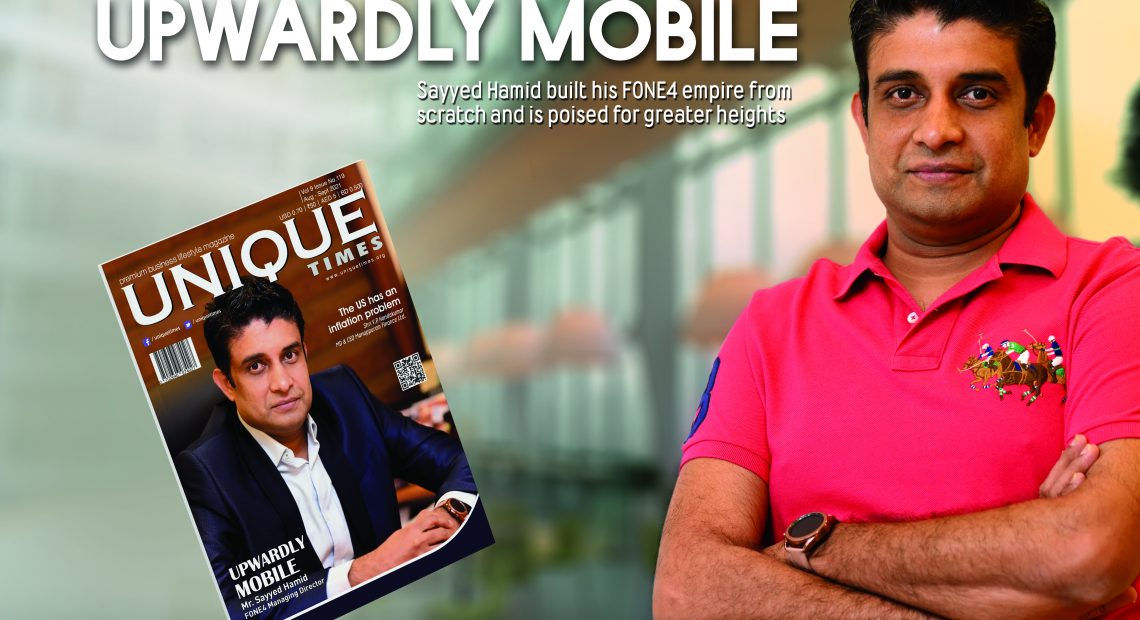
- Sujit Chandra Kumar
Mobile and automobile are the twin passions of Sayyed Hamid, the youthful and dynamic boss of FONE4, the popular retail chain in Kerala for mobile handsets. While the former obsession helps him qualify as one of the most promising and upwardly mobile entrepreneurs in the state, the latter makes him a man always on the move. If you try to reach him on his mobile phone – right now a Samsung Galaxy Z Fold2 but he changes one every six months – during the day, chances are that he may be driving down on his Lexus from Kochi to Bangalore, where he has set up his base now. Nothing gives him greater pleasure than driving along with his family of five in his hybrid car; on his wish list now is an electric vehicle that would be cost-effective and non-polluting.
His journey as a businessman started in 1997 from a room that his father owned in Kochi’s Penta Menaka, which is now a hub for all kinds of electronic products. Unlike many of his contemporaries, he did not inherit a business empire but built it from scratch from that one-room shop that he personally managed in those days along with two assistants.
Hamid’s dad, the late Sayyed Imbichi, hailed from Thrissur. He boasted of an MBA degree in those days and worked for a multinational company in the Middle East as a senior manager for over 30 years. Hamid’s mother was from Kozhikode, another city that he holds close to the heart besides Kochi and Bangalore. Little Hamid grew up in the Gulf as well as in hostels of educational institutions in Kerala but somewhere he developed a desire to become a businessman. For his graduation, he pursued automobile engineering – no surprises there – and later on, took an MBA degree too.
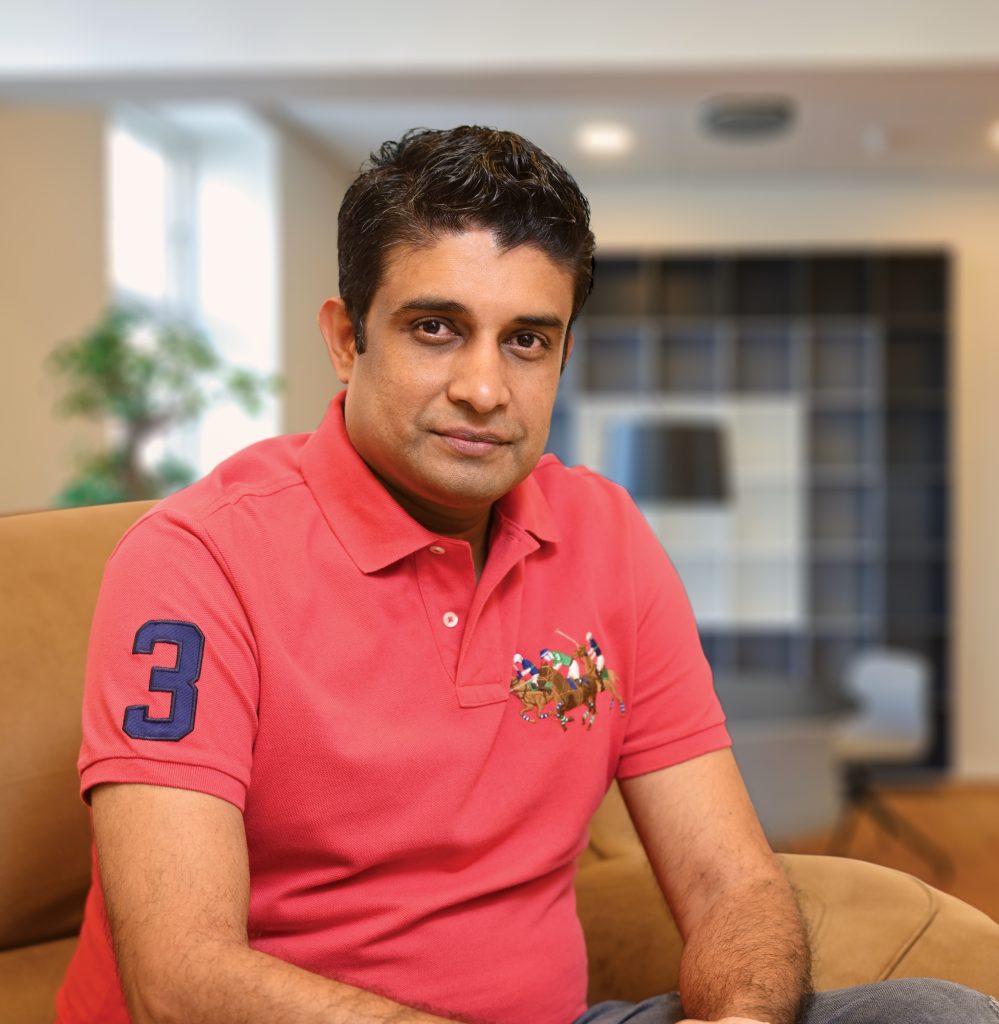
His dad worked as a consultant after retirement and set up a pharma company but Hamid charted his own course. He did look for a job in the beginning but didn’t land one that suited his interests. So, he paid a certain rent to his dad and started his first store in Penta Menaka, then called Mobile Gallery. “In those days, we used to sell handsets that came from Singapore which we procured from Chennai. This was the pre-Internet era when phones were used only for talking. These sets came with no warrantee or billing. The popular models then were Escotel, Nokia, Seimens, and Alcatel. My first phone was an Alcatel which must have cost around 2000 rupees,” he says. There were a couple of other similar, small outlets for mobile phones in Penta Menaka and the owners used to take turns to go to Chennai to procure handsets.
In those days, mobile phones were only for the well-heeled since incoming calls cost Rs 14 for 30 seconds. One of the main service providers was BPL and Hamid had a tie-up with that company’s local distributor. “I had many leading corporate clients in Kochi and besides selling them handsets, I was able to arrange the connection and this became my value-added service to them,” he says.
He still maintains that first store though it has moved its position in the building, nearer now to the entrance. “We used to have a counter and some pieces on display. There is no comparison to today’s stores,” he says. He has come a long way since then and at last count, he has 29 stores in all districts of Kerala barring Kannur, Kasaragod, Wayanad, and Idukki.
Right from the days of his first store, he brought in a personal touch in customer service. “Besides arranging the ‘SIM’ for them, I ensured good after-sales service too and this helped in developing a nice rapport with my clients. Formalities were more in those days in procuring the connection. For instance, for international roaming, people had to deposit a fixed sum. We acted as a facilitator.”
The turning point towards high growth came in 2013 when he relaunched the brand with a new name, Fone4. “There was no special reason for choosing this name except that we found it catchy. I never imagined then that it would go on to be such a large chain of stores. But the realisation had come that there was no point in functioning from just one store or one city,” he says. The second outlet thus came up in Kuruppam Road in Thrissur, a prime location.
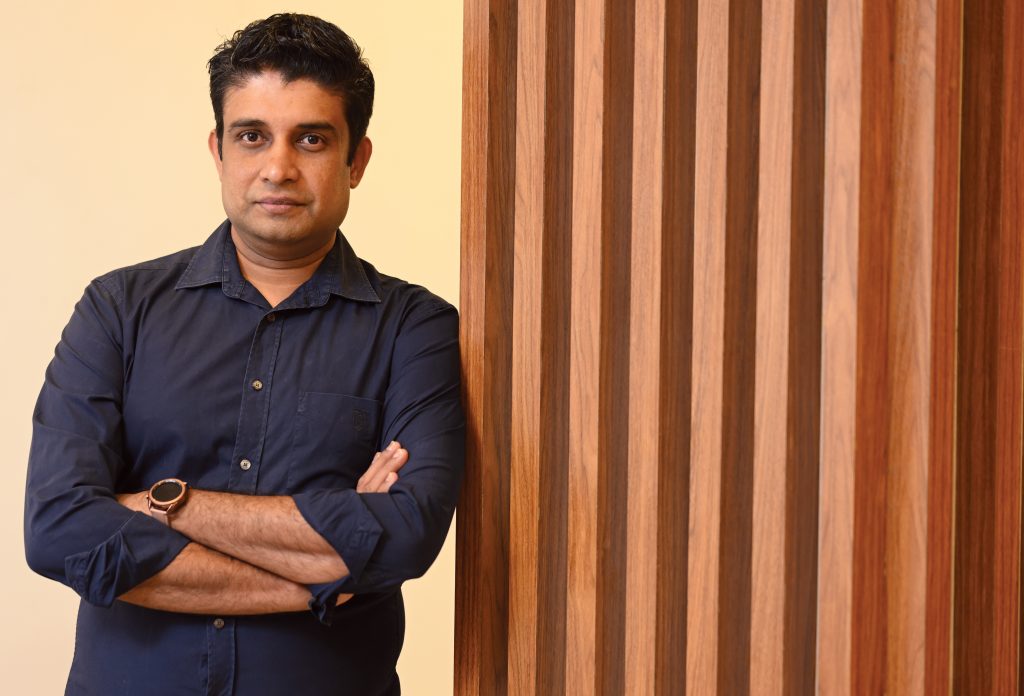
The specialty in this outlet was live demos of the various models for the customers. “Till then, it was not a practice to demonstrate the various features of a phone to the customers. Stores wouldn’t allow customers to unpack or take a look at a particular model. We invested in demo pieces and this resulted in a lot of customer satisfaction. Today, the mobile company shares 50 percent of the demo cost but not in those days. We also kept dedicated and trained staff to explain the features,” he says. In his Thrissur store, he pressed into service eight salesmen, so that customers’ needs could be attended to on priority. Overall, it was a new experience for the customers in Thrissur and the store was a stupendous success. Today, Fone4 has 350 employees including around 70 in their corporate office in Kochi, and boasts a turnover of over Rs 200 crore.
The high growth could be attributed to the fact that the mobile phone has become the go-to product for everyone in recent times. Around six years ago, there was a virtual explosion in mobile usage in Kerala. In fact, it replaced eight to 10 products, points out Hamid. “Once, we needed a VCR to watch movies. Now, we can watch a movie on the mobile itself and play games on it. It also replaced the clock, watch, alarm, calculator, and even the PC,” he points out.
What also fuels sales is that there is a need to replace phones at least once a year. “Most people opt for phones that cost below Rs 10,000. Such handsets are meant to be used for a couple of hours a day but youngsters use it for seven or eight hours and in six or seven months, these will need to be replaced,” he says. As online education picked up in a big way during the Corona phase, demand for mobile phones went up further but Hamid has a word of caution. “Nowadays, there are a lot of sponsors who donate phones to students. But they need to give handsets that have at least 3 GB RAM and not give any cheap handset. Because it doesn’t serve the purpose otherwise.”
His career graph is not without ups and downs, however. He tried to diversify into the hotel business and built three of them in Kerala and one in Bangalore but then Corona came in the way and he had to sell them off to concentrate on his core business of phones which was one of the few sectors still thriving. Even in his mobile phone business, he has suffered setbacks off and on. At one point, he had 35 stores but several of them had to be wound up, especially the ones he had launched in Karnataka.
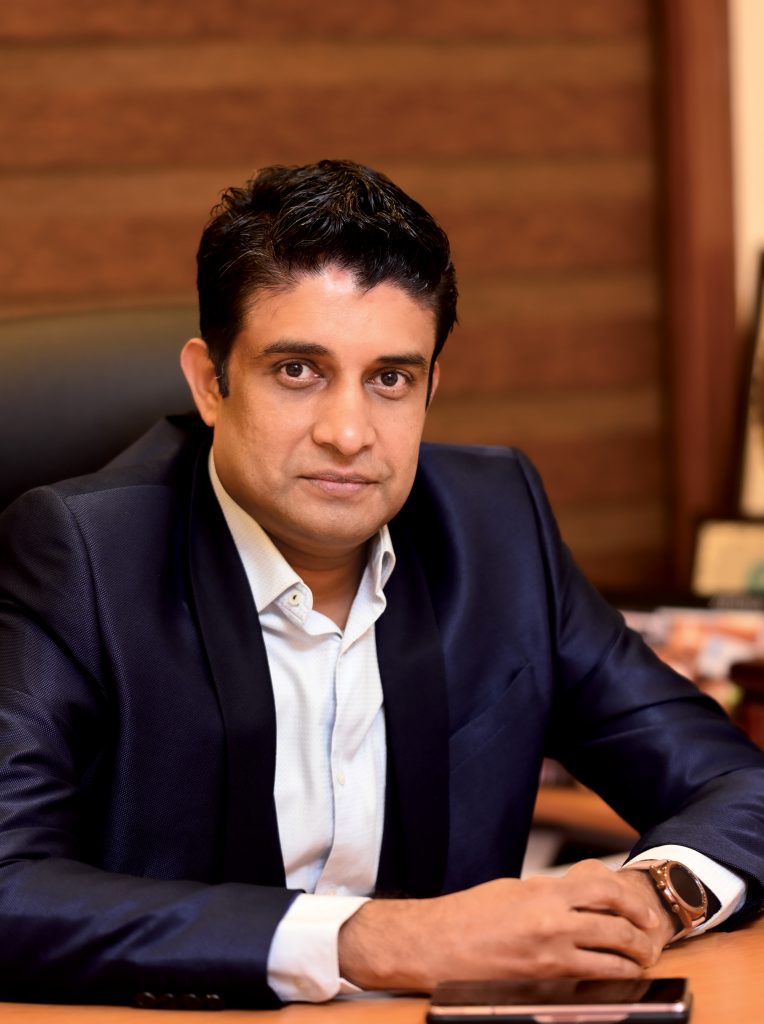
“I ventured into the Karnataka market without studying the customer behaviour properly,” he admits. “When I started my stores there, I knew 50 percent of the customers used to shop online for mobile phones. Today, that figure has grown to 62 percent. In Kerala, on the other hand, people want to touch and feel a product before committing to buy it. In a city like Bangalore, the professionals do not have the time for a store visit. The IT crowd is also very knowledgeable and know about phones sometimes better than the guy at the store. I was overconfident because wherever I started a store in Kerala, people were queuing up to buy phones. I expected the same trend in Bangalore but learned my lesson the bitter way.”
Food is another sector he has dabbled in, with notable success. Pizzas, fried chicken, and burgers fly off the shelves of Smoking Burg in Thrissur, which is next to the KFC outlet, without any significant advertising and there are now three more branches in Bangalore. “Food is always in demand,” he says. “If we give good products, we can attract as many customers as any international brand.” His wife Roudha Zerlina, who is a law graduate, also runs a chain of dessert joints in Bangalore called Pudding Jar. The couple have three school-going children – Zaara, Zaman, and Ayisha Zoya.
Before his mobile business took off in a big way, he tried to set up a farm of cows and goats in Palakkad but without much success. “At that time, I harboured a more peaceful life and constructed a house there. I used to visit the farm during the weekends. I had around 100 cows but could not go large scale because it didn’t work out the way I planned it out. The farm is still here but not much activity,” he says.
Of all the store launches that he has done, one that stands out in his memory, as well as that of Kochiites, is that of the MG Road outlet, which was inaugurated by the sexy siren of Bollywood, Sunny Leone. It was nothing less than a coup in event management when the whole stretch of MG Road was choc a bloc with fans who thronged to catch a sight of the actress and Hamid could not have asked for a better opening for his 24th branch. The event attracted national attention and was a talking point all over the mainstream as well as social media. “It was a gamble. Suppose I had brought someone like Shah Rukh Khan, I would have had to shell out much more. This idea clicked and I got a lot of free publicity about the event,” he says with glee. He had always got celebrities to inaugurate his stores but never before had he got such mileage.
It is not unusual for people to queue up for days when a new Fone4 outlet gets launched in Kerala. “I would buy handsets in bulk and sell them without taking a margin. People would then talk about the store,” he explains his strategy.
There is no special mantra in business to succeed, he says. “The product should be good and service should satisfy the customer. That is what people want. Look at the success of Oyo rooms. All that people want are a bed, A/C, and WiFi. Similarly, when you sell a product, you should be transparent and give people the best solution for the money they are spending. For us, it may be just a handset but for the customer, it may be his one-year savings. So, we need to be sensitive and meet his requirement. And, when he calls with a problem, we need to address it,” he says.
Covid-19 and the resultant lockdowns did pose a challenge but it also presented opportunities, Hamid says frankly. “Usually, we advertise a lot during Onam and offer big discounts. Without any such gimmicks, people queued up to buy phones and we could sell without special discounts and make profits. There was also a shortage of phones, so people were eager to buy. So, it did not affect us that much,” he says candidly. “I expect the Corona situation to remain till 2024. No point in getting obsessed about that unnecessarily. We need to look at the existing opportunities and tap those. We need to look at the small format model and cut costs as much as possible,” he says, revealing that he intends to open more stores in Malabar.
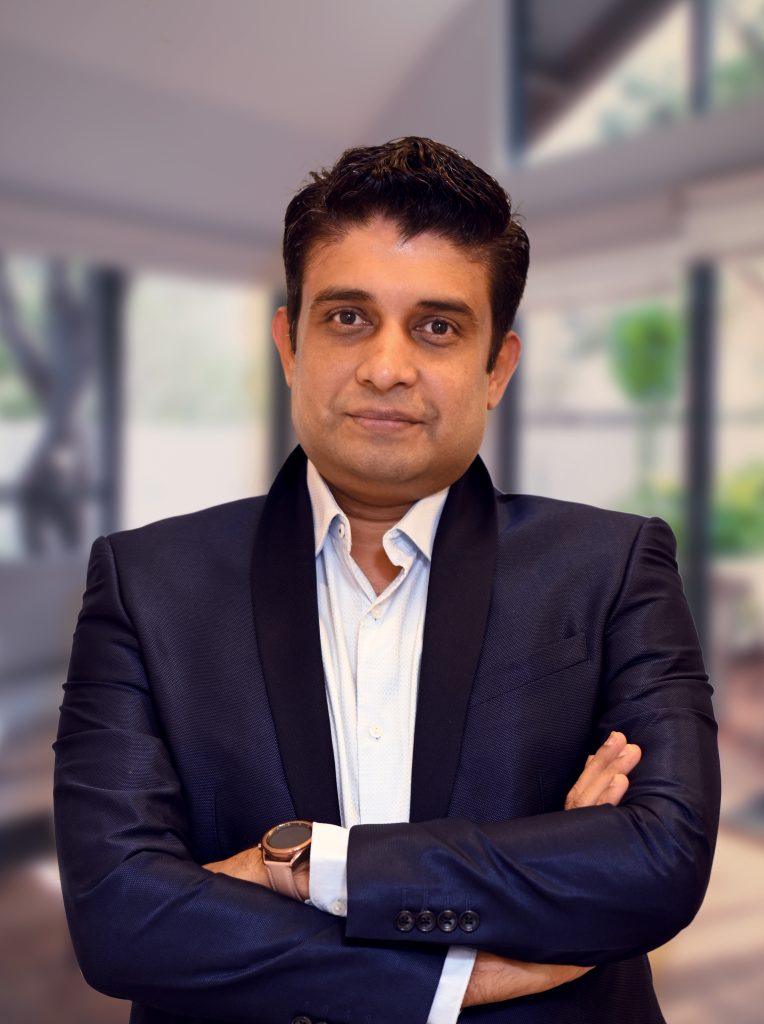
I bring his attention to the ongoing debate if Kerala has the right climate to do business or not and he replies without batting an eyelid: “I have no doubt in my mind that Kerala is the best place to do business. I have tried in Karnataka also, so I know this. Because the population is more in big cities, the opportunity may be more there. But the risk is also much more. Let us take the case of getting a simple licence. In Kerala, if your papers are in order, it may take a few days but you need to spend just 500 or 600 rupees. In other big cities, I can probably get the same licence in an hour but I have to spend Rs 10,000. It takes a little more time to get the same done in Kerala but it costs much less. It is a mere misunderstanding that the state is not business-friendly and that we rank behind others in ease of doing business. Suppose a problem crops up, we can settle it genuinely here. In other places, you need either money or influence to settle it. You can’t expect natural justice. But yes, if you are looking for growth, you need to go in search of bigger markets. In Kochi, if we have around 7-8 lakh people, Bangalore will have 15 times more customers.”
Does this mean that he is content with what he has achieved? By way of reply, he gives an enigmatic smile and lets on that he is planning an IPO in a year or two. Why not? After all, isn’t he also from Thrissur, the land of billionaires? “Oh, I am just an ordinary man,” he concludes
